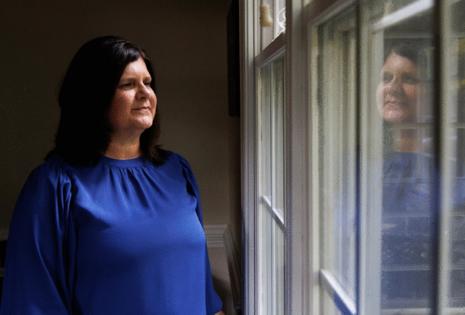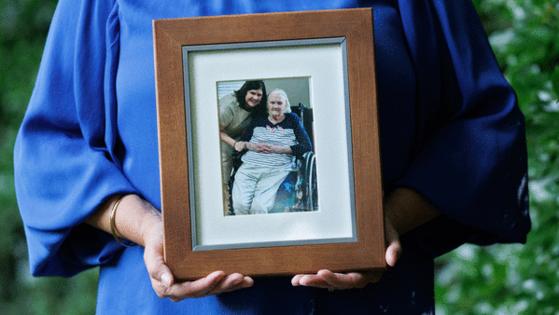NC woman needs Medicaid. That doesn't make her a 'parasite,' her daughter says
Published in News & Features
WASHINGTON — Sarah Cope doesn’t see her mother “as a parasite,” but that’s what she heard MAGA billionaire Elon Musk call her.
On Feb. 12, Musk reposted on social media a meme of a smiling woman with the caption: “Watching Trump slash federal programs knowing it doesn’t affect you because you’re not a member of the Parasite Class.”
Cope’s mother, Linda Davis, spent most of her life working in a factory to take care of her three children and her ailing husband, who died when Cope, their youngest, was 15.
When Davis was 90 and had experienced 10 years with dementia, her children determined that she needed a skilled nursing facility to care for her.
Medicare wouldn’t cover the costs.
Davis only receives $150 from a pension, and her Social Security check is nowhere near the $12,000-a-month cost to move into her nursing home in Harnett County, North Carolina, where she lived most of her life.
That’s why the Davis siblings turned to Medicaid.
“She didn’t have the financial resources, personally, to have private care or private insurance for that,” Cope said. “So for people who are elderly or low income, (Medicaid), in my opinion, really is the only viable option for people like my mom who need specialized care but don’t have the personal resources to pay for it.”
Changes to Medicaid
More than 260,000 people in North Carolina are at risk of losing their Medicaid coverage due to a provision in U.S. House Republicans’ One Big Beautiful Bill Act.
It’s part of $880 billion the House Committee on Energy and Commerce cut from its budget over 10 years as part of a bill that is largely being used as a vehicle to pass many of President Donald Trump’s campaign promises, including tax cuts.
The bill includes several provisions pertaining to Medicaid coverage, including a work requirement for adults between 18 and 64 that requires 80 hours per month working, volunteering, going to school or a combination. It would go into effect as soon as December 2026.
That would not affect Davis, but Cope, a Wake County resident, said admitting her mother to the nursing home, where she and her siblings visit daily, introduced her to many families who need the social safety net program. She’s seen how it’s affected their lives and hers.
Critics of work and enrollment requirements say that they can be confusing for people trying to sign up and cost money for states to implement.
“I feel like some of the people don’t understand the detrimental effects that this will have on people, and it’s also the trickle-down effect that these cuts in Medicaid will cause,” Cope said.
Senators proposed last week to make the work requirements extend to more people, and to limit a Medicaid provider tax from 6% to 3.5%. That’s aimed at preventing states from what some see as double-dipping — using a loophole that allows state officials to pay a provider more on a Medicaid patient’s bill, forcing the federal government’s match to also go up, while the state gets its money back through the provider tax.
The senators argue that this would save federal funding. But it would send state officials scrambling to figure out how to recoup the money they would lose that’s often used to fund the program. That could lead to higher taxes or cuts to programs.
And neither the Senate nor the House is done revising this provision, or other portions of the bill.
Supporters argue that the changes proposed to Medicaid cut out waste and misuse, and allow for the people the program was intended to use it, weeding out people gaming the system or people who are in the United States without legal authority.
Cope said she’s fearful for what the trickle-down effect on quality of health care would be if more people lose access to Medicaid.
“We become a more unhealthy population, and people start having to use emergency rooms as primary care, and they don’t get the proper screenings that they need for diseases because they don’t have the health insurance to cover those,” Cope said. “So all of a sudden they don’t get their screenings, so they don’t detect or can’t catch things early on and so we’ve become a more unhealthy population, which ends up costing people, even those with insurance, more and more.”
She added that in rural areas, hospitals and clinics depend on having a certain number of patients who receive Medicaid, and she worries some of those places may have to shut down or increase overall costs to cover the lack of funding.
She said after hearing about Musk calling people benefiting from federal programs “parasites,” she was infuriated and felt she had to speak out to help others who rely on Medicaid.
She partnered with the American Cancer Society to share her story publicly.
Factory work
Davis raised Cope and her two siblings, Randy Davis and Tammy Brown, in Sanford. There are eight years each between Davis and Brown and between Brown and Cope.
Their father was on disability because of a heart condition, so their mother worked in a factory.
“I still can’t imagine, but she worked in insulation and heating and air and gluing,” Cope said. “It was a very strenuous job that she worked most of her life.”
After her husband’s death, she continued working to provide for her children and for other family members who needed help. She lived paycheck-to-paycheck.
“My mom was never a parasite, and still to this day, is not a parasite,” Cope said. “She is someone who worked hard, earned what she could, cared for her family, provided for her family, and needs help now that she’s not able to get otherwise.”
Dementia diagnosis
At 80, Davis moved in with Brown, who was maintaining a 50- to 60-hour-per-week job.
Davis had begun showing signs of dementia, and her children didn’t think it would be safe for her to live alone anymore.
As dementia does, it began to affect Davis’ daily life.
It took away her awareness of how to stay safe.
Her hygiene habits faltered. She became unsteady on her feet, causing falls.
All of this caused her to be confused, rattled and agitated.
The siblings did their best to honor her wishes never to be placed in a nursing home.
All three siblings took turns taking care of their mother at their houses, but after a while they realized they needed professional help.
“We tried our best,” Cope said. “We did everything we could, but her dementia just got to the point that it wasn’t safe in any realm for her to be at home. We had to make the most difficult decision of our lives, to place her in a nursing home.”
Applying for Medicaid
That’s when they first applied for Medicaid. Cope said it was “not for the faint of heart.”
“It’s a very rigorous process, as it should be, and it was a lot of documentation, a lot of proof of eligibility, but after a while, we were able to make it happen,” Cope said.
The siblings didn’t have a backup plan if they weren’t approved.
“Honestly, (she is) without the financial resources for her to be able to pay for this herself, and we can’t afford $12,000 a month,” Cope said. “There was no ‘Plan B’ for us, and unfortunately if something were to happen now, and her health care insurance through Medicaid was cut for some reason, I don’t know what our plan would be.
“That’s very scary and weighs on our minds every day,” Cope said.
_______
©2025 McClatchy Washington Bureau. Visit mcclatchydc.com. Distributed by Tribune Content Agency, LLC.










Comments